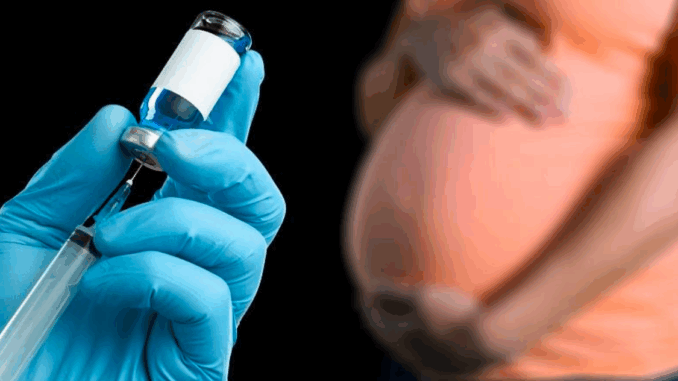
A senior CDC adviser at the forefront of the agency’s campaign to vaccinate pregnant women with the COVID-19 mRNA shot has stepped down in disgrace following a wave of damning studies linking the vaccine to serious health risks for mothers and their babies.
Dr. Lakshmi Panagiotakopoulos, a pediatric infectious disease expert who helped promote the COVID-19 vaccine to pregnant women, resigned Friday from her position as co-leader of a CDC working group on the COVID-19 vaccine and is leaving the agency.
In an email to colleagues, Panagiotakopoulos said her decision to resign was based on her belief that she is “no longer able to help the most vulnerable members” of the population. According to CBS News, she sent the email Tuesday morning.

BYPASS THE CENSORS
Sign up to get unfiltered news delivered straight to your inbox.
“My career in public health and vaccinology started with a deep-seated desire to help the most vulnerable members of our population, and that is not something I am able to continue doing in this role,” Panagiotakopoulos wrote.
Trump Releases Evidence Deep State Replaced Biden With Actors Before He Took Office
Reuters cited anonymous sources who said Panagiotakopoulos said her departure was “a personal decision.”
The CDC and the U.S. Department of Health and Human Services (HHS) did not respond to a request for comment.
 Top CDC adviser Dr. Lakshmi Panagiotakopoulos promoted COVID vaccination for pregnant women
Top CDC adviser Dr. Lakshmi Panagiotakopoulos promoted COVID vaccination for pregnant womenChildrens’ Health Defense reports: Panagiotakopoulos was a member of a working group of the CDC Advisory Committee on Immunization Practices (ACIP), which makes vaccine-related recommendations.
She was co-leader of a group tasked with gathering information that would be presented at ACIP meetings.
In October 2022, ACIP members unanimously recommended adding COVID-19 vaccines for children as young as 6 months old to the CDC childhood schedule.
In October 2023, the committee recommended expanding the childhood and adult immunization schedules, including recommendations for pregnant women.
The CDC approved the recommendations last year.
“For years, ACIP has pushed aggressive vaccine schedules — including for pregnant women — despite real safety concerns and lack of supporting data,” said Nebraska chiropractor Ben Tapper, a critic of COVID-19 vaccines. “ACIP’s response has been the same every time: approve, recommend and move on. No accountability. No transparency.”
During the COVID-19 pandemic, Panagiotakopoulos played a key role in the CDC’s COVID-19 vaccine response efforts, creating a registry that monitored the safety of COVID-19 vaccines administered during pregnancy.
Panagiotakopoulos also co-authored journal articles focusing on efforts to promote COVID-19 vaccination among pregnant women.
According to a paper she co-authored, published in January in Open Forum Infectious Diseases, “Understanding COVID-19 vaccination patterns and timing is important to assess adherence to vaccination recommendations among this high-risk population.”
Sayer Ji, founder of GreenMedInfo and co-founder of Stand for Health Freedom, said Panagiotakopoulos’ resignation “isn’t just a personnel change — it’s a signal flare.”
“Dr. Panagiotakopoulos helped shape the CDC’s COVID-19 vaccine policy, including its controversial push on pregnant women. Her abrupt departure suggests internal fracture and quiet dissent,” Ji said.
‘A massive reversal of policy’
Panagiotakopoulos presented data at ACIP’s April meeting on Moderna’s COVID-19 vaccine and options for the 2025-26 vaccination schedule.
According to Reuters, the working group “had been leaning toward” narrowing use of the vaccines — but recommending “broader use for certain at-risk populations, including very young children and pregnant women who are at high risk of COVID complications.”
Last week, HHS Secretary Robert F. Kennedy Jr. rejected these recommendations, announcing that the COVID-19 vaccine would be removed from the CDC’s recommended immunization schedule for children and pregnant women.
However, the CDC didn’t remove the vaccine from the schedule. Instead, the agency added a note stating that, instead of a universal recommendation that all children ages 6 months and older receive the COVID-19 shots, the CDC now recommends “shared clinical decision-making” between parents and providers for children ages 6 months to 17 years who are not moderately immunocompromised.
Reuters reported that this decision “was a departure from the usual process in which ACIP experts meet and vote on changes to the immunization schedule or recommendations on who should get vaccines before the agency’s director made a final call.”
“That’s a massive reversal of policy. And the fact that one of the CDC’s own experts couldn’t stand by and endorse it anymore should be setting off alarms,” Tapper said.
Latest Video
Source link


